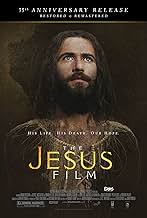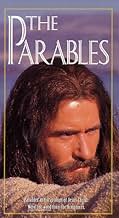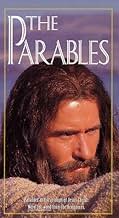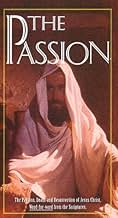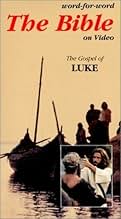VALUTAZIONE IMDb
7,1/10
2934
LA TUA VALUTAZIONE
Girato in autentici siti biblici in Israele, segue la vita di Cristo.Girato in autentici siti biblici in Israele, segue la vita di Cristo.Girato in autentici siti biblici in Israele, segue la vita di Cristo.
Alexander Scourby
- Luke
- (voce)
Yosef Shiloach
- Joseph
- (as Joseph Shiloach)
Zeev Berlinsky
- Blind Begger
- (as Ze'ev Berlinski)
Nissim Garamech
- Thomas
- (as Nisim Gerama)
Recensioni in evidenza
Here in the Bible belt of the United States, particularly in our Southern Baptist churches, when you say the name "Jesus Christ," most of us envision such a person as Brian Deacon, who stars as the title character of "Jesus" (1979). The plot of "Jesus" is generally well-known even by non-believers. The opening scene displays John 3:16-17 from the King James Version. Though the film claims to be entirely from The Gospel of St. Luke, it also mixes elements from Matthew's Gospel (i.e.: a more complete Lord's Prayer said by Christ and the use of the trinitarian baptismal formula).
Sadly, the acting in "Jesus" is almost as wooden as the oil-painted icons of the Eastern Church. Brian Deacon delivers a sort of solemn, meek interpretation of Jesus of Nazareth--making the scene in which he casts out the money-changers from the temple--look as if he is only frustrated, and not righteously angry. However, in the film's defense, the acting in "Jesus" is much more a product of its time in that this was generally accepted as to how Jesus acted.
"Jesus" is perhaps one of the greatest films ever made, not because of its production values or acting, but because of its content. This 80-minute film, translated into God knows how many languages, has communicated the Gospel to millions all across the globe. "Jesus," the forerunner of such films as "The Gospel of John" (2003) and "The Passion of the Christ" (2004), is one of the finest examples of evangelical film-making. Recommended for everyone.
Sadly, the acting in "Jesus" is almost as wooden as the oil-painted icons of the Eastern Church. Brian Deacon delivers a sort of solemn, meek interpretation of Jesus of Nazareth--making the scene in which he casts out the money-changers from the temple--look as if he is only frustrated, and not righteously angry. However, in the film's defense, the acting in "Jesus" is much more a product of its time in that this was generally accepted as to how Jesus acted.
"Jesus" is perhaps one of the greatest films ever made, not because of its production values or acting, but because of its content. This 80-minute film, translated into God knows how many languages, has communicated the Gospel to millions all across the globe. "Jesus," the forerunner of such films as "The Gospel of John" (2003) and "The Passion of the Christ" (2004), is one of the finest examples of evangelical film-making. Recommended for everyone.
The story of Jesus as told by this movie is faithful to the Bible version. It does not flinch from some of the uglier parts of the story, such as the crucifixion. Jesus was a soft-spoken man, with dark complexion and long hair. This is more accurate than portraying him as a blond-haired, blue-eyed WASP.
One question, though: why was this movie ever rated G? The proper rating is PG-13, although it would have been rated PG because we did not have the PG-13 rating at the time.
One question, though: why was this movie ever rated G? The proper rating is PG-13, although it would have been rated PG because we did not have the PG-13 rating at the time.
The Jesus Film is a wonderful Jesus movie that adapts The Gospel of Luke, save for John 3:16-17. The movie also sticks very close to The Bible. It's one of the best movies ever made about Jesus, though admittedly looking at it as a movie, it has a few flaws.
As I said, The Jesus Film stays very close to Luke. There are many well done scenes, such as Mary's visit from Gabriel, the Crucifixion and Reurrection, and miracles such as the feeding of the 5,000 and bringing a dead girl to life. We see parables like The Good Samaratian and an uplifting rendition of the change of Zaccheus, a tax collector.
Due to the Biblical accuracy, The Jesus Film has been used around the world by missionaries to spread the Gospel, which lead to many foriegn people becoming Christians. In fact, there are over 1,000 translations, including sign language versions. As a result, it is the most translated film of all time- praise God!
Jesus is played by Brian Deacon, and he is one of the best actors to play our Savior. He presents Jesus in both ways performance wise. His portrayal is very human and divine at once.
There are other good performances as well, such as Niko Nitai, who plays Peter. Alexander Scourby, known for his audio recording of the Bible, narrates as Luke. There are many other fine roles as well.
As an adaptation of the Gospels, this undoubtedly gets a 10. This is easily one of the best Jesus movies ever made. However, as I mentioned, as a movie, it has a few issues.
One easy example is the scene where Jesus calms a storm. It's clearly filmed during the day, and the acting here is poor. When Peter shouts for Jesus, he just says: "Help us. Help us Lord." with no emotion. There is also a scene where Peter sobs for denying Jesus, and he clearly sheds no tears.
It's known that most of the actors had thick accents and needed to be dubbed, so that is not Niko's fault. I just can't fathom how the dubbers passed off those recordings without further takes.
The movie is 2 hours long, and that's just fine. The movie is very enjoyable for a person like me, who enjoys Biblical epics. That said, the movie does seem to drag often. The last 2 times I have viewed The Jesus Film, it has taken me 4, not 2 hours to view it. There's nothing I'd take out or anything, but the 2 hours are a bit too slow paced for a movie.
While the movie is very Biblically sound, there are some metaphors that are taken literally. When Jesus is baptized, Alexander Scourby says that the Holy Spirit descended on Jesus AS a dove. A dove then lands on Jesus.
This is to dramtize Luke 3:22, which says:"and the Holy Spirit descended on him in bodily form LIKE a dove." It seems that there was no real dove, although for visual purposes I can see why that was done. Still, it appears to be an inaccurate way to view that verse.
When Jesus prays in Gethsemane in the movie, he sweats blood. Luke 22:44 says "And being in an agony he prayed more earnestly: and his sweat was AS it were great drops of blood falling down to the ground."
On the DVD Jesus: Fact or Fiction? There is a version of the film that has features explaining possible ways that Jesus miracles could have occurred, and one included is "Is it possible to sweat blood?". Apparently, one CAN in fact sweat blood if they are distressed enough.
However, the verse says that Jesus's sweat was AS drops of blood falling, so, again, in a plain reading, it appears that Jesus was profusely sweating at the thought of being crucified.
Also, for some reason Jesus does not wear a crown of thorns on the cross- why this was done or how it went unnoticed is beyond me.
It is true that as a piece of cinema, The Jesus Film has flaws- slow pacing, slight inaccuracies from Scripture, mediocre effects, and poor dubbing. However, as a Bible movie, there is much merit to the film, and today it remains as one of the most powerful and accurate movies about Jesus's life to date compared to some others. (Jesus Christ Superstar comes to mind in the Jesus department.)
Minor critiques aside, there are few Jesus, or Bible movies for that matter, that I would recommend more than this. In the genre of Biblical epics, consider The Jesus Film to be a must see.
As I said, The Jesus Film stays very close to Luke. There are many well done scenes, such as Mary's visit from Gabriel, the Crucifixion and Reurrection, and miracles such as the feeding of the 5,000 and bringing a dead girl to life. We see parables like The Good Samaratian and an uplifting rendition of the change of Zaccheus, a tax collector.
Due to the Biblical accuracy, The Jesus Film has been used around the world by missionaries to spread the Gospel, which lead to many foriegn people becoming Christians. In fact, there are over 1,000 translations, including sign language versions. As a result, it is the most translated film of all time- praise God!
Jesus is played by Brian Deacon, and he is one of the best actors to play our Savior. He presents Jesus in both ways performance wise. His portrayal is very human and divine at once.
There are other good performances as well, such as Niko Nitai, who plays Peter. Alexander Scourby, known for his audio recording of the Bible, narrates as Luke. There are many other fine roles as well.
As an adaptation of the Gospels, this undoubtedly gets a 10. This is easily one of the best Jesus movies ever made. However, as I mentioned, as a movie, it has a few issues.
One easy example is the scene where Jesus calms a storm. It's clearly filmed during the day, and the acting here is poor. When Peter shouts for Jesus, he just says: "Help us. Help us Lord." with no emotion. There is also a scene where Peter sobs for denying Jesus, and he clearly sheds no tears.
It's known that most of the actors had thick accents and needed to be dubbed, so that is not Niko's fault. I just can't fathom how the dubbers passed off those recordings without further takes.
The movie is 2 hours long, and that's just fine. The movie is very enjoyable for a person like me, who enjoys Biblical epics. That said, the movie does seem to drag often. The last 2 times I have viewed The Jesus Film, it has taken me 4, not 2 hours to view it. There's nothing I'd take out or anything, but the 2 hours are a bit too slow paced for a movie.
While the movie is very Biblically sound, there are some metaphors that are taken literally. When Jesus is baptized, Alexander Scourby says that the Holy Spirit descended on Jesus AS a dove. A dove then lands on Jesus.
This is to dramtize Luke 3:22, which says:"and the Holy Spirit descended on him in bodily form LIKE a dove." It seems that there was no real dove, although for visual purposes I can see why that was done. Still, it appears to be an inaccurate way to view that verse.
When Jesus prays in Gethsemane in the movie, he sweats blood. Luke 22:44 says "And being in an agony he prayed more earnestly: and his sweat was AS it were great drops of blood falling down to the ground."
On the DVD Jesus: Fact or Fiction? There is a version of the film that has features explaining possible ways that Jesus miracles could have occurred, and one included is "Is it possible to sweat blood?". Apparently, one CAN in fact sweat blood if they are distressed enough.
However, the verse says that Jesus's sweat was AS drops of blood falling, so, again, in a plain reading, it appears that Jesus was profusely sweating at the thought of being crucified.
Also, for some reason Jesus does not wear a crown of thorns on the cross- why this was done or how it went unnoticed is beyond me.
It is true that as a piece of cinema, The Jesus Film has flaws- slow pacing, slight inaccuracies from Scripture, mediocre effects, and poor dubbing. However, as a Bible movie, there is much merit to the film, and today it remains as one of the most powerful and accurate movies about Jesus's life to date compared to some others. (Jesus Christ Superstar comes to mind in the Jesus department.)
Minor critiques aside, there are few Jesus, or Bible movies for that matter, that I would recommend more than this. In the genre of Biblical epics, consider The Jesus Film to be a must see.
A somewhat expurgated version of the gospel of Luke, Brian deacons version of Jesus is appealing, if somewhat un-animated. I have a great love for this film ( mainly due to the fact that it was the first film about Jesus I can remember seeing from my childhood.) Not as epic as Zeffirelli's film, nor as graphic as Gibson's, a faithful representation with only a few omissions ( I'm sure either due to budget or time constraints). the acting is at times somewhat melodramatic, but that is part of the charm of this film. the cinematography is not ground breaking but certainly serves its purpose and doesn't overshadow the story, and really thats one of the best things about this film, nothing in it overshadows the story as a whole.
From a motion picture perspective, the "Jesus" film is primitive and flawed for audiences who are familiar with cinematic convention. From a biblical story-telling perspective however, it is brilliant. I'm therefore rating it at just "5" - half-way between love and hate, as I shall explain in this review.
That the producers achieved what they set out to do is indisputable: it's the most watched movie of all time. That the film is clear and truthful to the Gospel account of Luke is indisputable. That we need to consider the intended audience is also indisputable. Released just two years after Zeffirelli's magnificent masterpiece, "Jesus of Nazareth", this film comes across as is a lifeless clone... IF you've seen the Zeffirelli film, that is.
But what if you haven't -- what if you couldn't; maybe because you live in the jungle some place away from TV sets and westernised living? Then some chaps come into your village, set up a sheet between trees, wait for dark and then display these "magic pictures". NOW which film is the most powerful? The tables are turned, and all of a sudden, the "Jesus" film comes out tops. The film is not sophisticated, but it's not meant to be. Its power is not due to the imagery, but due to the Word of God that it illustrates.
Now, what about all the narration? It makes it sound like one of those old 16 mm "Fact and Faith" films that my maths teacher showed in school way back. Like an old newsreel. For a start, narration makes the translators' tasks much easier- it is, after all, the most translated film in history. However, during the climax, we actually loose the narrator altogether - a very unusual device, and I'm still not sure if it works that way or not. If I was cynical, I'd say the narrator went off for a coffee break, but I think they did it that way to help draw the audience, sitting spellbound on the hard earth, more into the story. The idea of any cinematic style has long left the screen, so it probably really doesn't matter, and on the primitive level, it certainly works.
Again, desperately failing not to be cynical, I see this film as perhaps the Protestant answer to the Catholic "Jesus of Nazareth" that it desperately tries to copy in part, and which was released just two years earlier. It reflects the fundamentalist ethos that it's okay to "use" film for religious purposes, but it is not okay to be absorbed by it. Art can be tolerated so long as the message is loud and clear. I don't mean to be cruel or mean; I admire and respect the folks who made this. However, I guess I just fail to understand why the producers were not able to get a few more talented people to guide the project to completion. It is a prime example of blinkered movie vision. In the end, it doesn't really matter, however, because the purpose of the film is to help non-Christians encounter Christ himself in his resurrection power - not to have a great night out.
As a side note, I have figured out a way to really enjoy this movie. Get something useful to do like washing the dishes or painting a wall. Then, put the movie on in the same room, and listen to the soundtrack as you work, and forget it even has moving pictures. The film makes excellent audio, and it has a wonderful added bonus: whenever you get really curious, all you need to do is take a peek at the screen, and low and behold, as if by magic, there's a moving picture of what you've just been listening to! A quite awesome way of listening to the Bible on tape. Because the visuals are almost entirely incidental, you can "listen" to the movie and not miss a thing!
On this film, I'm really sitting on the fence. For achieving what it set out to do, which is basically tell the story of Jesus to primitive audiences, I'd rate it 10 out of 10. As a film, with any depth of artistic talent, I have to be honest and give it a 1 out of 10. So I have to settle for a 5 rating. Which is one higher that the 4 that I hated myself for originally giving it, before writing this review and finding a valid reason to mark it up at least one notch.
That the producers achieved what they set out to do is indisputable: it's the most watched movie of all time. That the film is clear and truthful to the Gospel account of Luke is indisputable. That we need to consider the intended audience is also indisputable. Released just two years after Zeffirelli's magnificent masterpiece, "Jesus of Nazareth", this film comes across as is a lifeless clone... IF you've seen the Zeffirelli film, that is.
But what if you haven't -- what if you couldn't; maybe because you live in the jungle some place away from TV sets and westernised living? Then some chaps come into your village, set up a sheet between trees, wait for dark and then display these "magic pictures". NOW which film is the most powerful? The tables are turned, and all of a sudden, the "Jesus" film comes out tops. The film is not sophisticated, but it's not meant to be. Its power is not due to the imagery, but due to the Word of God that it illustrates.
Now, what about all the narration? It makes it sound like one of those old 16 mm "Fact and Faith" films that my maths teacher showed in school way back. Like an old newsreel. For a start, narration makes the translators' tasks much easier- it is, after all, the most translated film in history. However, during the climax, we actually loose the narrator altogether - a very unusual device, and I'm still not sure if it works that way or not. If I was cynical, I'd say the narrator went off for a coffee break, but I think they did it that way to help draw the audience, sitting spellbound on the hard earth, more into the story. The idea of any cinematic style has long left the screen, so it probably really doesn't matter, and on the primitive level, it certainly works.
Again, desperately failing not to be cynical, I see this film as perhaps the Protestant answer to the Catholic "Jesus of Nazareth" that it desperately tries to copy in part, and which was released just two years earlier. It reflects the fundamentalist ethos that it's okay to "use" film for religious purposes, but it is not okay to be absorbed by it. Art can be tolerated so long as the message is loud and clear. I don't mean to be cruel or mean; I admire and respect the folks who made this. However, I guess I just fail to understand why the producers were not able to get a few more talented people to guide the project to completion. It is a prime example of blinkered movie vision. In the end, it doesn't really matter, however, because the purpose of the film is to help non-Christians encounter Christ himself in his resurrection power - not to have a great night out.
As a side note, I have figured out a way to really enjoy this movie. Get something useful to do like washing the dishes or painting a wall. Then, put the movie on in the same room, and listen to the soundtrack as you work, and forget it even has moving pictures. The film makes excellent audio, and it has a wonderful added bonus: whenever you get really curious, all you need to do is take a peek at the screen, and low and behold, as if by magic, there's a moving picture of what you've just been listening to! A quite awesome way of listening to the Bible on tape. Because the visuals are almost entirely incidental, you can "listen" to the movie and not miss a thing!
On this film, I'm really sitting on the fence. For achieving what it set out to do, which is basically tell the story of Jesus to primitive audiences, I'd rate it 10 out of 10. As a film, with any depth of artistic talent, I have to be honest and give it a 1 out of 10. So I have to settle for a 5 rating. Which is one higher that the 4 that I hated myself for originally giving it, before writing this review and finding a valid reason to mark it up at least one notch.
Lo sapevi?
- QuizThe film has been translated into over 1000 languages to date (including 10 different sign language versions), and 235 more translations are in progress, making it the most translated film in history.
- BlooperAfter laying the body in the tomb, the actor under the burial shroud can clearly be seen breathing.
- Versioni alternativeAn alternate version was filmed concurrently with the English one, with the actors speaking in the authentic languages (Aramic, Hebrew, Greek and Latin) appropriate for the events and people portrayed. This version is then used with a voice-over narration in any of several modern language.
- ConnessioniEdited from New Media Bible, The: The Gospel According to St. Luke (1979)
- Colonne sonoreConcerto brandeburghese No. 1, BWV 1046 : 2° movimento
by Johann Sebastian Bach
I più visti
Accedi per valutare e creare un elenco di titoli salvati per ottenere consigli personalizzati
- How long is The Jesus Film?Powered by Alexa
Dettagli
- Data di uscita
- Paese di origine
- Siti ufficiali
- Lingua
- Celebre anche come
- The Jesus Film
- Luoghi delle riprese
- Aziende produttrici
- Vedi altri crediti dell’azienda su IMDbPro
Botteghino
- Budget
- 6.000.000 USD (previsto)
Contribuisci a questa pagina
Suggerisci una modifica o aggiungi i contenuti mancanti




